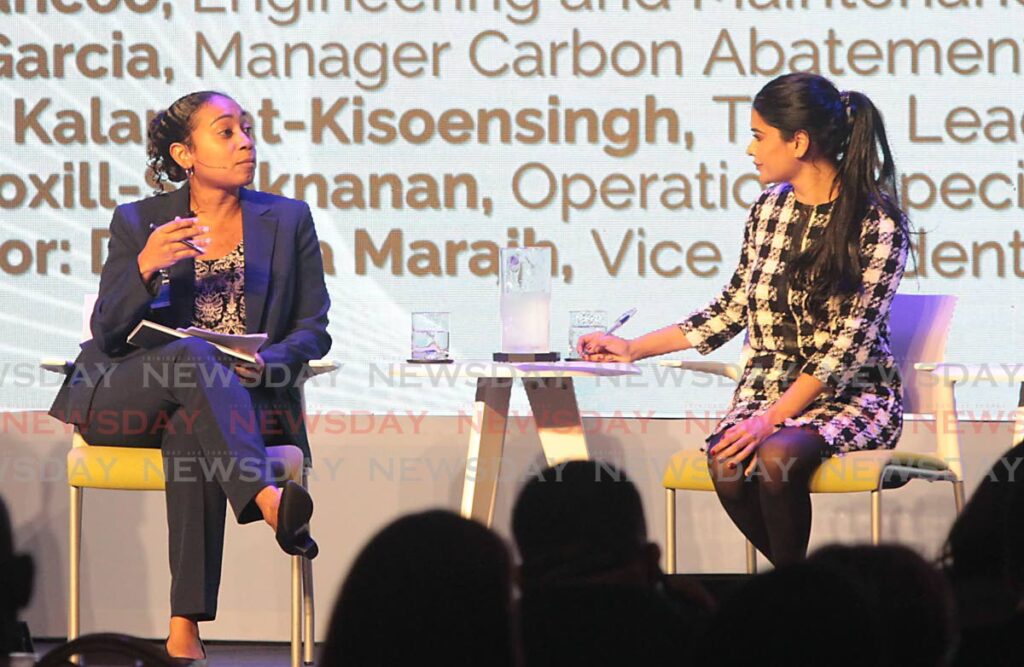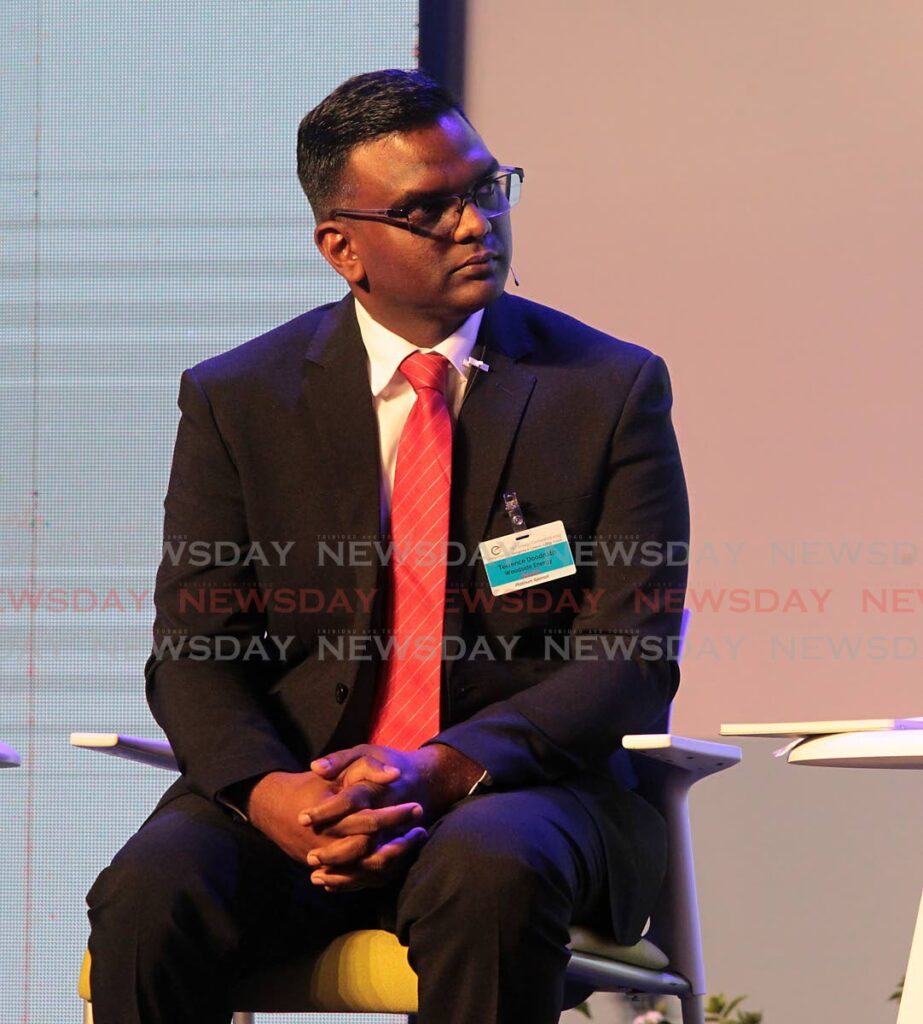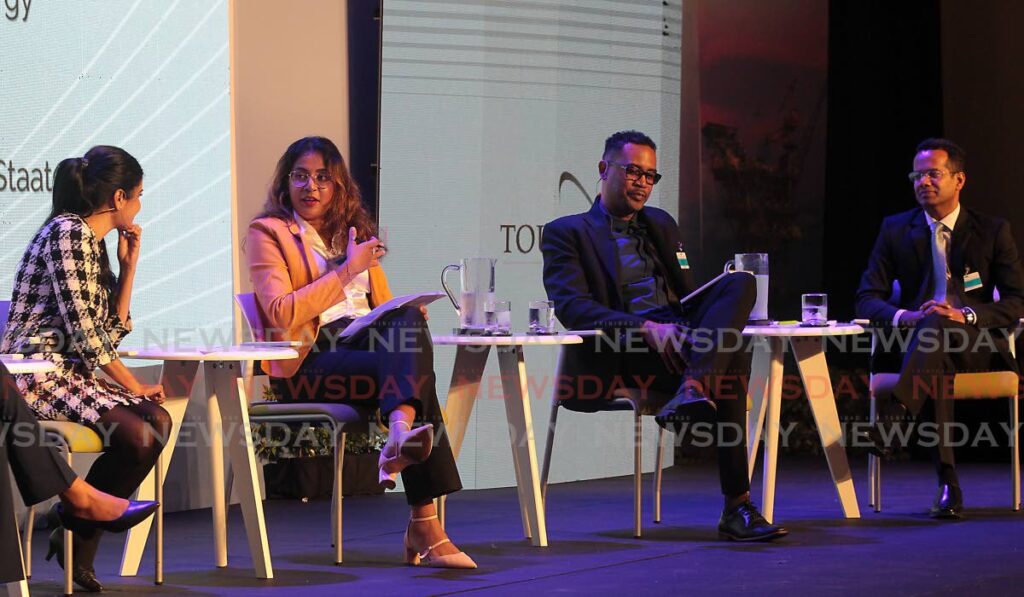Young leaders on way forward for energy sector

Six young leaders of leading energy companies in Trinidad and Tobago are all set to navigate the sector's complex future.
The six spoke about the direction for the country's energy development during a special young leaders session at the TT Energy Conference, Hyatt Regency, Port of Spain on Tuesday.
On the panel were Tanagna Lessey-Kelly, acting business venture manager of National Energy, Terrence Doodnath, surface engineering manager of Woodside Energy, Barry Nancoo, engineering and maintenance manager of Proman, Shawn Garcia, manager carbon abatement of Atlantic LNG, Sharista Kalapnat-Kisoensingh, team lead, deep-water exploration contract, offshore directorate of Acreage and Staatsolie, Jenna Boxill-Sooknanan, operations specialist of Methanex with the facilitator being Dr Priya Marajh, vice president, advocacy and member engagement of the Energy Chamber.
Marajh asked Doodnath what his generation would have in terms of leadership in the industry and what changes he would make. Doodnath said the changes that the industry is dealing with now are no different in terms of a need for "total consciousness" and adaptation of technology and learning.

He said, “In terms of the triggers and challenges, it’s probably no different. But I see the advantages we have in utilising the same triggers to address technology to be able to do data analysis, decision-making, and the use of artificial intelligence for example. So I do think the tools that we do have available to support the change process, if effectively used will help us to successfully navigate that change.”
Boxill-Sooknanan said, “We grew up in an era with information being readily available at our fingertips and what we would prefer is to use technology that is available to maximise our efficiency and to make optimal use of our resources. So I believe that innovation and digitisation are essential to transforming the energy sector in a more decentralised and a more renewable-based economy. I believe our generation is just more connected too. The generation to come will be even more connected and more skilled in the technological world to come.”
Lessey-Kelly said there are sectors that should allow for the current leaders to be more flexible.
“I will bring it straight to the transition, I’ve been waiting for the transition for a number of years and we are at a point now where our scope and time in leadership, we will be implementing those changes. That would call for some differences in how we would handle leadership.
"We need to focus on visionary leadership or transformational leadership where we would focus on the end game yet also look at transforming the way we interact and deal with our colleagues. We would need to be flexible, agile, to think strategically, to get and implement the changes that are required for the energy transition.”
Garcia was asked if he saw a difference in leadership from the younger leaders and said, “As a future leader I think that we have to shift our thinking a bit and sometimes that may mean to challenge ourselves a bit from our traditional paradise. Do we go agile or transformational? Do we look to the former ways of working or embrace hybrid ways of working?”
Garcia said as a future leader, the need to broaden responsibilities is there and so to the need to demonstrate the servant leadership.
Doodnath said the biggest change needed to navigate the change is ensuring that everyone is aligned to a common starting ground.

He said, “We’ve heard some different groups, different government agencies and industries on what does sustainability mean for them and I would argue that sustainable energy is not new, I’ve been in the industry for about ten years and we have been talking sustainable (development) since I’ve been here. But there is a recognition that all the triggers, all the outside influences, the technology available are actually raising the bar of what sustainable means. Making sure that we agree as an industry on the target is the first thing then making sure we agree and prioritise is another key thing.”
Lessey-Kelly said from her experience at NGC and seeing the responsibility it has on the facilitation and development in sustainable energy industries in TT, she said, “One the key changes that we see that needs to take place is within education and awareness.”
Boxill-Sooknanan said high capital investments would be needed to develop the technological aspect of the energy industry and the need to carefully develop policies and implement the ones that will strengthen a renewable energy market.
She added that those should “provide incentives to both small and large organisations to want to commit and achieve that net-zero industry.”
“With that said, achieving longer-term gas contracts is a way of being incentive to want to commit to that capital to achieve that net zero. Additionally, I believe that more partnerships need to be had with the private sector as well as in collaboration with the public sector.”
Boxill-Sooknanan said it would help companies be more efficient as they would be able to share resources to better equip the industry.

Comments
"Young leaders on way forward for energy sector"